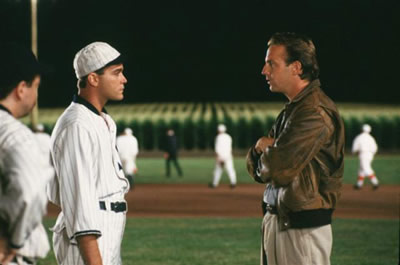



A vision inspires Ray Kinsella (Kevin Costner) to cut a baseball diamond
out of his Iowa cornfield, and a mysterious voice tells him, ''If you
build it, he will come.'' As Ray surveys his work, he says to his wife,
Annie (Amy Madigan), ''I have just created something totally
illogical.'' And she replies, ''That's what I like about it.''
 Maybe
it was just such a voice that told Phil Alden Robinson to make a movie
out of W.P. Kinsella's Shoeless Joe, a moonlit novel about
baseball, dreams, family, the land and literature. Those are not exactly
logical ingredients for a Hollywood movie, but Robinson went ahead
anyway, and the result is Field of Dreams, a film written and
directed by Robinson that's as wonderful and inviting as Ray's ball
field.
Maybe
it was just such a voice that told Phil Alden Robinson to make a movie
out of W.P. Kinsella's Shoeless Joe, a moonlit novel about
baseball, dreams, family, the land and literature. Those are not exactly
logical ingredients for a Hollywood movie, but Robinson went ahead
anyway, and the result is Field of Dreams, a film written and
directed by Robinson that's as wonderful and inviting as Ray's ball
field.
Casting Costner as the dreamer was equally inspired. Right from the
outset he conveys a man with his feet on the ground and his head in the
clouds. Initially distrustful of the voice he hears, he catches his
young daughter watching Jimmy Stewart in Harvey on TV and snaps
off the set, telling her, ''The man is sick. Very sick.'' Almost every
note of Costner's Stewartlike performance is true, even though he
dresses like Ralph Lauren's idea of an Iowa farmer.
At first nothing happens when Ray builds his little park, but one night
his daughter announces, ''There's a man on your lawn.'' It turns out to
be Shoeless Joe Jackson (Ray Liotta), the favorite ballplayer of Ray's
late father. In one of the movie's best scenes, Shoeless Joe and Ray
feel each other out, not with words but with fungoes and BP. At the end
of the session, Shoeless Joe tells Ray, ''There are more of us,'' and
soon all eight of the Black Sox are playing ball.
Then Ray hears the voice again, and this time it says to him, ''Ease
his pain.'' In the book, that command leads Ray to J.D. Salinger -- he
feels that he must find the reclusive writer and take him to a baseball
game at Fenway Park. In the movie, the writer is the fictitious Terence
Mann, played with great gusto by James Earl Jones. It's perfectly
understandable why Robinson sends in a pinch hitter for the litigious
Salinger. Still, readers of Kinsella's book will miss the joy of having
the author of The Catcher in the Rye come out of hiding.
Robinson also eliminates two major characters from the novel -- the
oldest living Chicago Cub and Ray's twin brother -- but those cuts help
streamline the story. Robinson, whose only previous directorial effort
was the romantic box office dud In the Mood, adds some nice
touches to Field of Dreams. He makes Ray and Annie refugees from
the '60s, which helps explain their willingness to risk their farm for a
dream. There is more interaction between the players and Ray in the
movie than there is in the book; there's a very nice little moment when
Annie calls Ray in for dinner, and the players singsong, ''Dinner,
Raaaayyy.''
At Fenway, the characters played by Costner and Jones see a strange
message flashed on the scoreboard and hear the voice say, ''Go the
distance.'' That command leads them to Chisholm, Minn., to find
Moonlight Graham, who played half an inning once for the New York Giants
and then became a country doctor. Burt Lancaster is splendid as the
player-turned-doctor.
In support of Costner, Madigan is very good as his feisty and loving
wife, and so is Gaby Hoffman as their daughter. Liotta, however, does
not exactly have the look and feel of Joe Jackson. For one thing, he
bats right and throws left, exactly the opposite of the real Jackson,
and for another, he has a much larger vocabulary than Shoeless Joe, who
was illiterate. The only other sore thumb in the movie is a sentimental
rhapsody to baseball delivered by Jones, but that's easily forgiven and
forgotten.
Even if the movie weren't so good, Robinson and Universal Studios
would deserve a lot of credit for making this illogical film. Costner,
too, was bucking conventional wisdom by acting in his second baseball
movie in a year (he also starred in Bull Durham). But then,
Field of Dreams transcends the genre. Comparing this with the box
office hit Major League is a little like comparing The New
Yorker to Mad magazine. Field of Dreams is not for
everyone, but if you're the kind of person who can't get through the
holiday season without watching It's a Wonderful Life or the
baseball season without The Pride of the Yankees, then run, don't
walk ...

